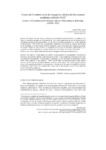Mostrar o rexistro simple do ítem
Léxico de Cantabria en la decimoquinta edición del diccionario académico (DRAE-1925)
| dc.contributor.author | Peña Arce, Jaime | |
| dc.date.accessioned | 2020-03-03T08:35:25Z | |
| dc.date.available | 2020-03-03T08:35:25Z | |
| dc.date.issued | 2019 | |
| dc.identifier.citation | Peña Arce, J. (2019). Léxico de Cantabria en la decimoquinta edición del diccionario académico (DRAE-1925). Revista de Lexicografía, 25, pp. 35-58. DOI: https://doi.org/10.17979/rlex.2019.25.0.5988 | es_ES |
| dc.identifier.issn | 1134-4539 | |
| dc.identifier.uri | http://hdl.handle.net/2183/25081 | |
| dc.description.abstract | [Resumen] El objetivo de este trabajo es alcanzar una descripción total, cuantitativa y cualitativa, del léxico de Cantabria recogido en el diccionario de 1925, texto considerado un hito en la historia de la lexicografía académica. Hay que destacar, por un lado, el espectacular aumento del corpus analizado en esta edición (+ 140 %); por otro, los materiales empleados para realizar tal aumento: por primera vez, la Academia, en lo que respecta al léxico montañés, recurre a los materiales incluidos en repertorios locales. Dentro de estos, destaca el compilado por Eduardo de Huidobro (1867-1936), quien recogió los vocablos empleados en las obras narrativas de José María de Pereda (1833-1906). | es_ES |
| dc.description.abstract | [Abstract] The objective of this paper is to achieve a total quantitative and qualitative description of the lexicon of Cantabria collected in the dictionary of 1925, a text considered a milestone in the history of academic lexicography. It is necessary to emphasize, on the one hand, the spectacular increase of the corpus analyzed in this edition (+ 140%); on the other, the materials used to make such an increase: for the first time the Royal Spanish Academy, with regard to the lexicon from Cantabria, resorts to the materials included in local repertoires. Among these, the repertoir compiled by Eduardo de Huidobro (1867-1936), who collected the words used in the narrative works of José María de Pereda (1833-1906), stands out | es_ES |
| dc.description.sponsorship | Ministerio de Economía y Competitividad; FFI2017-82437-P | es_ES |
| dc.language.iso | spa | es_ES |
| dc.publisher | Universidade da Coruña | es_ES |
| dc.relation.uri | https://doi.org/10.17979/rlex.2019.25.0.5988 | es_ES |
| dc.rights | Atribución-NoComercial-CompartirIgual 4.0 España | es_ES |
| dc.rights.uri | http://creativecommons.org/licenses/by-nc-sa/3.0/es/ | * |
| dc.subject | Lexicografía dialectal | es_ES |
| dc.subject | Diccionarios integrales | es_ES |
| dc.subject | Diccionarios diferenciales | es_ES |
| dc.subject | Dialectal lexicography | es_ES |
| dc.subject | Integral dictionaries | es_ES |
| dc.subject | Differential dictionaries | es_ES |
| dc.title | Léxico de Cantabria en la decimoquinta edición del diccionario académico (DRAE-1925) | es_ES |
| dc.title.alternative | Lexicon of Cantabria in the fifteenth edition of the academic dictionary (DRAE-1925) | es_ES |
| dc.type | journal article | es_ES |
| dc.rights.accessRights | open access | es_ES |
| UDC.journalTitle | Revista de Lexicografía | es_ES |
| UDC.volume | 25 | es_ES |
| UDC.startPage | 35 | es_ES |
| UDC.endPage | 58 | es_ES |






